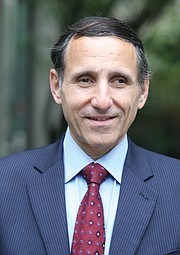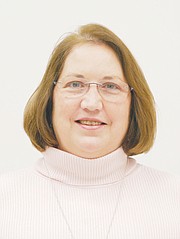Goldman has until Aug. 30 to show signatures on Coliseum referendum were wrongly rejected
Jeremy M. Lazarus | 8/23/2019, 6 a.m.
Paul Goldman is refusing to give up on his effort to allow Richmond voters to weigh in on the huge and costly plan to replace the Richmond Coliseum.
A feisty political operative who played a key role in creating the elected mayor position, Mr. Goldman believes that a faulty count of the nearly 15,000 petition signatures he submitted on the proposed Coliseum referendum is the reason the proposal was knocked off the ballot.
The leader of the Put Schools First campaign, who has spent a year trying get to city voters the Coliseum issue that could cost taxpayers $600 million, is determined to prove that his “Choosing children over costly coliseums” advisory referendum did gain enough signatures to qualify for the Nov. 5 ballot or a special election.
Mr. Goldman’s proposed non-binding referendum would allow voters to register their opinion on requiring the city to shift to the public schools 51 percent of any money collected from a special tax district the city sets up to pay off debt on a new Coliseum. That would essentially undermine the key tool the city wants to use to pay off money borrowed to build the planned new arena.
If the referendum to change the City Charter is passed by voters, it would have to go to the General Assembly for approval.
Joined by volunteers, Mr. Goldman is undertaking a line-by-line review of the signatures rejected by Richmond Voter Registrar Kirk Showalter and submitted to Richmond Circuit Court last week. Her report to the judge stated that the number of signatures on the petitions fell 400 short of the required 10,341 signatures of qualified registered voters to put the issue on the ballot.
A printout of her report on the accepted and rejected signatures was 888 pages.
Chief Richmond Circuit Court Judge Joi Jeter Taylor accepted Ms. Showalter’s report during an Aug. 15 hearing, but agreed that Mr. Goldman is entitled to review Ms. Showalter’s findings. Judge Taylor gave Mr. Goldman until Friday, Aug. 30, to submit evidence that the count was wrong.
Ms. Showalter dismisses his claims of a faulty count. She told the Free Press that the more than 1,200 petition pages Mr. Goldman submitted “were reviewed as ordered by the court and according to applicable state regulations.”
However, Mr. Goldman said he and his volunteers have found that the signatures of hundreds of registered voters who signed the petitions were improperly rejected.
Among them, he said, are radio talk show host Gary Flowers and well-known attorney Thomas M. Wolf and his wife, former School Board member Carol A.O. Wolf, who were listed as “cannot be identified” even though their names and addresses on the petitions are identical to those on the voter registration rolls.
Mr. Goldman said he anticipates finding as many as 400 signatures in that category once the review is completed.
In addition, hundreds of other people registered as Richmond voters on the state voting list were disqualified for writing on the petition an address different than the one on the voting rolls, Mr. Goldman said. He said the final count could involve 600 to 700 such signatures.
He said a state law on referendum petitions, 24.2-684.1, does not require signers to list an address as is the case with candidate petitions. While an address could help with identification, he said Ms. Showalter’s method essentially disqualifies people who move a lot, notably low-income people seeking to help get a referendum on a citywide issue on the ballot.
“I think that is just wrong,” he said.
A Free Press reporter checked a sample of 19 pages of the petitions Mr. Goldman submitted and found at least eight registered voters listed as “cannot be identified” despite a match between the petition information and the names and addresses on the voting rolls. At least 10 more individuals show up as registered Richmond voters despite an address change.
Former Attorney General Anthony Troy, who is not representing or working with Mr. Goldman, independently said that Mr. Goldman has made a correct reading of the law regarding referendum petitions. He said the General Assembly loosened the requirements regarding petition signers on referendums and added that an address is not required by law.
He also noted that the General Assembly modified the definition of a “qualified voter” in 2013 to make it easier for people who had moved to sign petitions for candidates. In the case of a citywide referendum like Mr. Goldman is pushing, Mr. Troy indicated that the change would mean a voter registered in the city could legitimately sign even if the address on the petition was different from the one on the voting rolls.
Ms. Showalter stated that state regulations require the “new address and the old address to be in the same precinct” before the signature can be accepted, even on a citywide issue.
She also said that she would have to see the names of petition signers whose names and addresses were exact matches to the information on the voter rolls.
“I can’t accept verbal claims,” she said.
City officials, including Mayor Stoney, have criticized Mr. Goldman’s proposed referendum as needless grandstanding. Richmond School Board member Cheryl Burke and Rev. Orrin K. Pullings Sr. of the United Nations Church in South Side also have been vocal in their concerns over Mr. Goldman’s efforts to let voters have a say on the Coliseum redevelopment plan. They filed a motion to dismiss the referendum outright. Judge Taylor has not ruled on their motion.
Mr. Goldman’s referendum could be the last shot for Richmond voters to express their opinion on the plan to replace the Richmond Coliseum.
A majority of City Council members rejected an effort by 8th District Councilwoman Reva M. Trammell and 2nd District Councilwoman Kim B. Gray to put an advisory referendum on the Nov. 5 ballot that would allow voters to express themselves on the plan to use taxpayer funds to pay for the proposed 17,500-seat replacement arena.











